Death Sentence Confirmed For Two Iranian Protesters
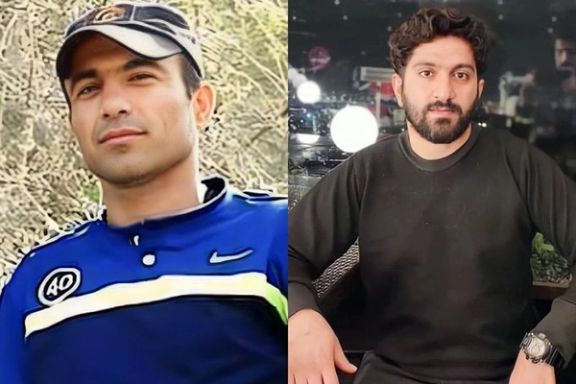
Reza Rasaei and Mojahed Kourkour, protesters sentenced to death, have been dispatched for execution.

Reza Rasaei and Mojahed Kourkour, protesters sentenced to death, have been dispatched for execution.
Azardokht Haqjouyan, Reza Rasaei's mother, asserted her son's innocence and pleaded for assistance to prevent the execution of his death sentence. She revealed that her son's extensive 1,500-page case file had been reviewed within a week.
Rasaei faces accusations of "murder" in connection with the death of Nader Beirami, the head of intelligence in Sanandaj, during a protest in the city on November 17, 2022.
Mojahed Kourkour's sister confirmed on December 24 that her brother's death sentence had been ratified in the 39th branch of the Supreme Court.
Kourkour is among the detainees of the nationwide uprising in Izeh, arrested on December 20, 2022 during an armed attack by security and law enforcement forces on a village near Izeh.
The judiciary identifies him as the "main suspect" in the killing of 10-year-old Kian Pirfalak, but Kian's family steadfastly maintains that the perpetrators were government forces. The situation has raised international concern over the due process and human rights in Iran.
In the latest annual report, Human Rights Activists In Iran (HRANA) claimed the execution of 746 individuals, noting a 32 percent increase of executions from 2022 and death sentences issued rising by 68 percent.
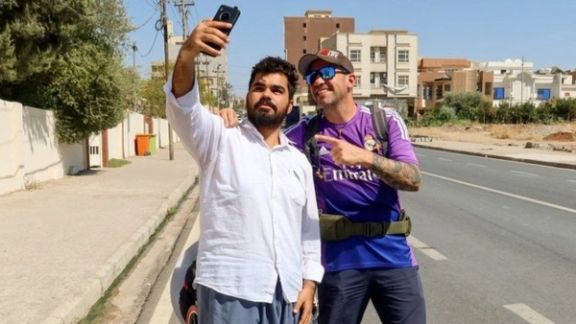
Iran’s embassy in Spain confirmed the release of Santiago Sánchez, a Spanish football fan held on espionage charges during his trip from Madrid to Qatar's World Cup.
Sánchez had been detained in Tehran amidst an extensive Middle East tour on his way to Qatar but is understood to have been arrested after visiting the grave of Mahsa Amini, the symbol of the 2022 uprising who died in morality police custody.
Before his unexplained disappearance in October 2022, Sánchez, a former paratrooper and devoted Real Madrid supporter, documented each leg of his extensive journey on social media. Starting his expedition in January 2022, he traversed Europe, Turkey, and Iraq before facing over a year of detention in Iran.
“The embassy of the Islamic Republic of Iran is pleased to announce the release of Santiago Sanchez Cogedor, the only Spanish citizen detained in Iran,” the Iranian Embassy in Spain posted on social media. “His release comes amid friendly and historic relations between the two countries and in accordance with the law.”
Tehran is known to be holding over 10 Western nationals, with accusations from governments and NGOs suggesting that Iran is employing them as leverage in negotiations involving its own citizens.
The release was a "humane and legal" step, Iran's Foreign Ministry spokesperson said on Monday, without giving further details.

Iranian women's national soccer team player, and Emory University team member Melika Mohammadi, tragically died in a car accident last week, while visiting Iran.
On Sunday, she was commemorated at Tehran's Azadi Stadium before her repatriation to the United States for burial.
Born in the southern Iranians city of Shiraz in 2000, Mohammadi died on December 24 at the age of 23 in a car accident near the city of Bam in eastern Iran where she played for the city’s Khatoon FC, the winner of the 2022-2013 Iranian league title.
“Melika was also a women’s right activist and large empowering force to younger generations,” her teammates at Emory women’s soccer team for which she played for two years wrote on Instagram.
Female fans of Esteghlal FC honoring the memory of Mohammadi at a match in Tehran on December 30.
“She really wanted to empower other women in Iran and had plans for setting up several soccer schools in Iran with her own money to help other girls whose training opportunities are very limited,” a family member told Iran International.
The memorial during which Mohammadi’s flag-draped coffin was carried by military guards was attended by Mohammadi’s parents and other family members, friends, some sports officials, and several athletes.
Mohammadi’s sister, Aida who was wearing her sister’s number 18 national team shirt, and several others, ran a victory round at the stadium Sunday in her honor.
This was the first time such a ceremony was being held for a female athlete at Azadi Stadium. As a woman, Mohammadi had never practiced or played there due to an unwritten ban.
Women have not even been allowed to watch men’s matches at Azadi and other stadiums for four decades, except in a few rare cases, due to the ban. The world’s soccer authority (FIFA) has tried to convince the Islamic Republic for nearly a decade to lift the ban on women attending stadiums to watch male players. In recent months the ban has been relaxed somewhat.
Women’s matches are also never shown on TV.
Mohammadi’s coffin being carried at Azadi Stadium
Mohammadi started playing soccer from a very young age. She was invited to play for the national girls’ soccer team at the age of eleven and later to the under-17 team and the national women’s team.
Most recently, Mohammadi played as a midfielder for the national women’s soccer team. She played a pivotal role in her team in the 2022 AFC Women’s Asia Cup, the first ever win in the games for Iran's women’s team.
Since the age of 13, when she moved to the United States with her family, Mohammadi had also simultaneously played for Walt Whitman High School in Bethesda, Maryland as well as Emory University of Atlanta, Georgia, from where she received her Bachelor of Science in anthropology and human biology.
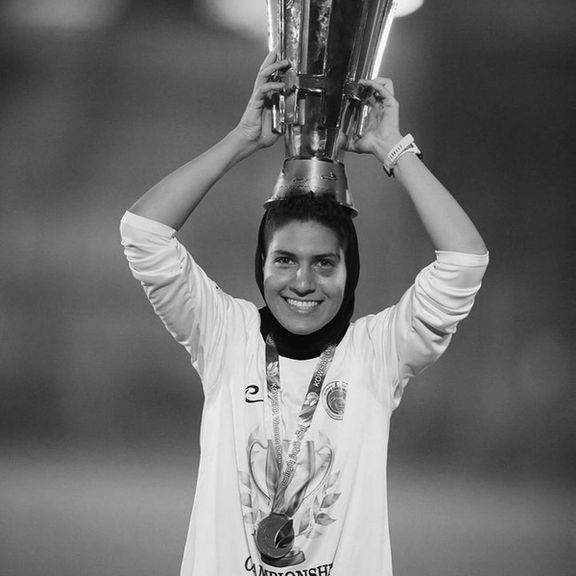
To be able to play for the national team in Iran and study in the US, she had to travel back and forth between Iran and the United States throughout these years.
Her mother said in a speech at the memorial ceremony at Hafezieh Stadium of Shiraz that her daughter decided to play in the Iranian league and the national team to help “shatter the glass ceiling” keeping Iranian women from success.
In the past few days Mohammadi has been remembered by fans with posters, silence, and chants at several matches.
Video posted by former national team coach, Maryam Irandoust, shows Melika and her teammates singing on a train during a tour.
“Iranian women who do not have a share of Azadi Stadium are only given their right of presence there after they die, ... Melika Mohammadi is truly commemorated only when women can freely be [allowed] presence at Azadi,” one of the tweets about the event read.
“Alas that Melika came to Azadi Stadium, for the first and last time, in these circumstances,” the very popular former TV football commentator and producer Adel Ferdosipour, who attended the ceremony at Azadi Stadium, told reporters referring to the unwritten ban on women’s team practicing and playing at the stadium like men’s team.
“Melika darling, you were the reason … Iranian female soccer players could go Azadi Stadium, a stadium where they had never trained there even once,” Hajar Dabbaghi, another national soccer team player wrote on Instagram while criticizing male soccer players for failing to show up at Melika’s remembrance.
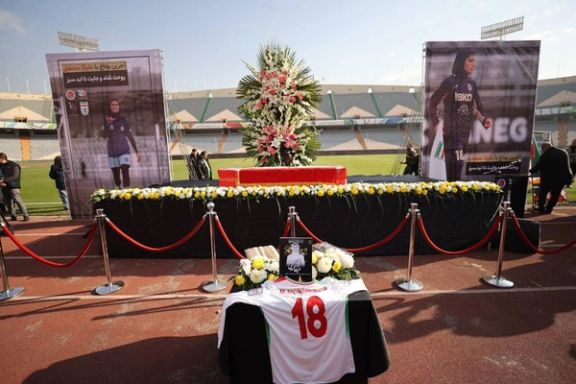
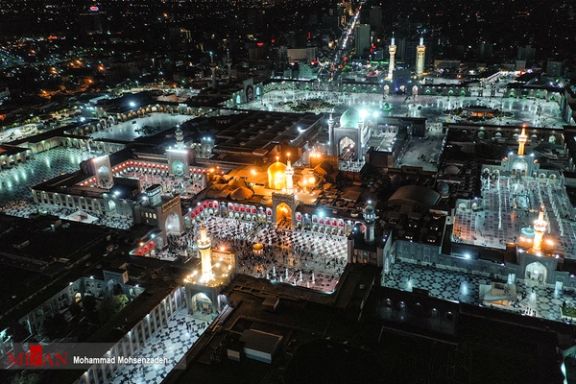
A municipal worker in the religious city of Mashhad resorted to self-immolation within the premises of an administrative building after facing unemployment.
ILNA news agency has identified him as Haji Ghadir Arab Teimouri, a 42-year-old worker employed by Mashhad Municipality.
The incident unfolded on Thursday, when Arab Teimouri, with a commendable 19-year employment history in the regulatory affairs of the Parks Organization, committed an act of self-immolation.
According to ILNA, the worker found himself unemployed under circumstances described as "uncertain reasons," leading to his suspension.
As of the latest update, Arab Teimouri is undergoing treatment at a hospital, where he is reported to have sustained 35% burns. His condition is labeled as "dangerous" due to physical complications and underlying health issues.
This incident sheds light on a growing concern for workers' suicide. Notably, two contract workers of the Chovar Petrochemical Company in Ilam, resorted to self-immolation on December 21 following the announcement of a mass layoff of workers within the petrochemical plant.
The primary factors contributing to the alarming trend of worker suicides in Iran are reported to be challenging living conditions and the impact of widespread job layoffs. Within a span of less than two years, six workers within the Chovar Petrochemical Company alone have taken their own lives in response to the distressing circumstances of layoffs.
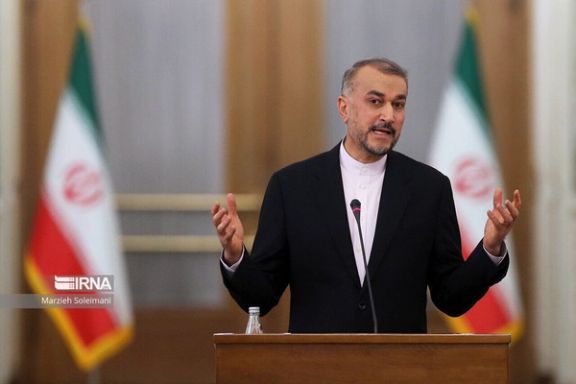
Iran's Foreign Minister criticized what he termed "coercive measures" employed by human rights institutions in their investigation of the 2022 protests.
In a meeting held in Tehran on Sunday, Hossein Amir-Abdollahian claimed that such measures “lack legal or legitimate justification".
In the wake of the unrest, the UN Human Rights Council initiated a fact-finding mission to probe the reported human rights violations in the aftermath of the widespread protests ignited in September following the death of Mahsa Amini in morality police custody.
Protesters were met with severe repression by Iranian authorities. Reports indicate the use of excessive and lethal force, over 500 killed and the arrest of tens of thousands of protesters and peaceful dissidents.
Amir-Abdollahian also claimed that a committee, led by President Ebrahim Raisi, has been established to investigate the 2022 protests. According to him, this committee signifies the "accountability and seriousness of the Islamic Republic in supporting human rights."
Human rights organizations are actively engaged in investigating the deaths of hundreds, including 69 children, during the protests. The primary focus of the investigations is to seek justice for victims and survivors of extrajudicial killings, mass arbitrary detentions, torture, and other serious abuses allegedly perpetrated by the Islamic Republic in response to peaceful demonstrations.
The lack of independence and impartiality in Iran's judicial system complicates domestic avenues for accountability, making it challenging to address alleged injustices and abuses within the country.
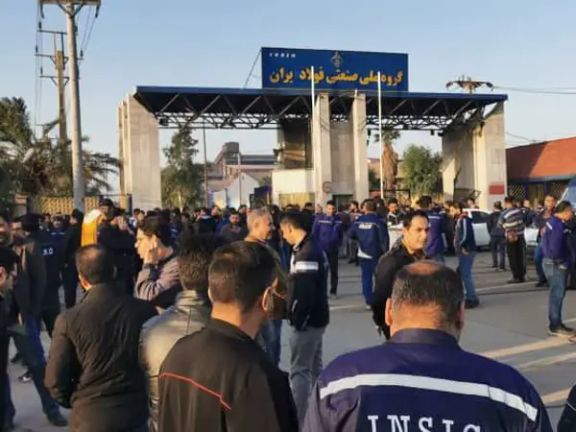
Entering its eighth consecutive day, the strike by Ahvaz National Steel Group workers has escalated as they took control of all entry and exit points of the company.
The Free Union of Iranian Workers Telegram channel reported a gathering and protest march by the workers on Saturday morning.
Videos from the eighth day of the strike depict protesting workers chanting defiant slogans refusing "to accept humiliation." In one video, a worker from Ahvaz National Steel Group declared, "Protests will persist until our demands are addressed."
The discontent in Ahvaz stems from the recent termination of 21 employees and the failure to implement job classification plans. Workers engaged with representatives from the Khuzestan province's General Department of Labor, the National Bank, and various government agencies on Thursday, as reported by the Free Union of Iranian Workers.
A published list of demands for the meeting included the "Removal of the corrupt CEO, eliminating National Bank ownership, and granting workers a role in company management." However, no outcomes have been disclosed yet. The workers also released a statement ahead of the scheduled meeting, affirming their intent to continue the strike as long as "authorities' threats and inaction persist."
On the second day of protests, an additional 17 employees faced work restrictions. The Iranian National Steel Industrial Group, once controlled by Amir Mansour Aria's investment firm, has transitioned to private ownership following legal proceedings and Aria's execution for embezzlement.
In recent months, workers across various industries, guild members, and retirees have initiated protests against the prevailing economic conditions. Unfortunately, these demonstrations have often been met with security force crackdowns.